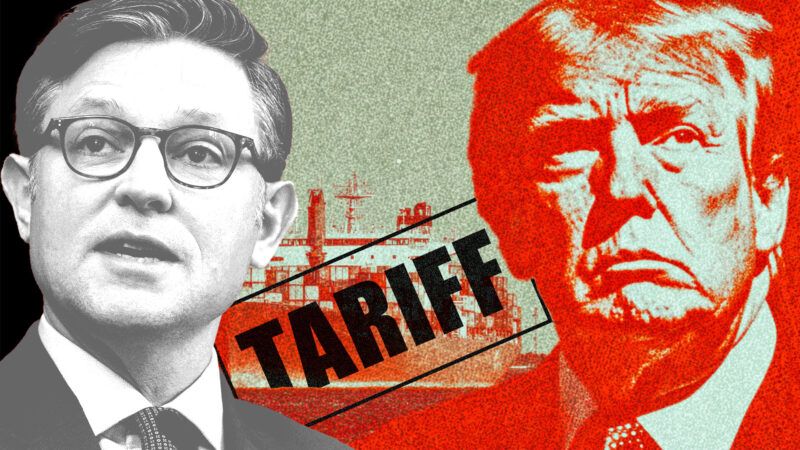House Republicans Just Voted To Give Even More Tariff Power Away to Trump
House Republicans passed a resolution that prevents Congress from ending the national emergency Trump is using to impose tariffs until March 31.

Since President Donald Trump took office, Congress has abdicated its constitutional authority—and responsibility—to "lay and collect Taxes, Duties, Imposts and Excises" to the executive branch. On Tuesday, the House of Representatives voted yet again to prevent itself from reclaiming these powers from the president.
The vote was on a procedural measure that passed out of the Rules Committee on Monday, which included a provision to "extend until March 31 a block on efforts…to end the national emergencies underlying Trump's sweeping tariffs," reports Politico. The measure passed in a partisan 213–211 vote, with only Reps. Thomas Massie (R–Ky.), Kevin Kiley (R–Calif.), and Victoria Spartz (R–Ind.) breaking party ranks.
The measure mirrors House Resolution 211, which cleared the House in March and "blocked the most direct pathway for lawmakers to revoke the emergency executive powers" Trump used to levy tariffs "on goods from Canada, Mexico, and China," Reason's Eric Boehm wrote at the time. The March resolution deemed each remaining day of the first session of the 119th Congress as not a day "for purposes of section 202 of the National Emergencies Act [NEA] with respect to a joint resolution terminating a national emergency declared by the President on February 1."
The NEA grants Congress the authority to cancel all national emergencies declared by the president through a law or joint resolution. This includes emergencies invoked by the International Emergency Economic Powers Act (IEEPA)—the law that Trump has used to levy tariffs on many of America's trade partners—which authorizes the president to impose asset freezes, trade embargoes, and sanctions, but not tariffs. By refusing to recognize days during which Section 202 of the NEA is considered, Congress ceded its ability to nullify Trump's February IEEPA tariffs until January 3, 2026.
Tuesday's resolution follows the same logic. House Resolution 707 nullified the provisions of "section 202 of the National Emergencies Act…from September 16, 2025, through March 31, 2026 [with respect to] a joint resolution terminating the national emergency declared by the President on July 30." That national emergency was declared the day before Trump's July 31 executive order further modifying the reciprocal tariff rates, which were first imposed on "Liberation Day" in April. This order not only levied across-the-board duties on Mexico, Canada, and China, as Trump did in February, but imposed not-so-reciprocal tariffs on every country with which the U.S. has normal trade relations. By passing this resolution, the only way Congress can interfere with Trump's reciprocal tariffs would be to pass a law amending the IEEPA statute itself, which almost certainly will not happen.
Rep. Suzan DelBene (D–Wash.), who voted against the resolution, tells Reason that "House Republicans have yet again abdicated their constitutional role over trade policy to President Trump, effectively capitulating to the largest tax increase on Americans in history."
As Congress has sat idly by, courts have been deliberating the constitutionality of Trump using IEEPA to set tariffs.
In May, the Court of International Trade (CIT) unanimously ruled that Trump's IEEPA tariffs were "beyond the scope of executive power, and…blocked [them] by a permanent injunction," Ilya Somin, one of the plaintiffs' attorneys, explained at the time. The U.S. Court of Appeals for the Federal Circuit upheld the CIT's ruling on August 29, but vacated the lower court's universal injunction. Pending an oral argument before the Supreme Court in the first week of its November session, Trump's tariffs remain in effect.
The Supreme Court wouldn't be involved if Congress hadn't delegated its tariff power to the president through laws like the Trade Expansion Act of 1962 (responsible for Section 232 tariffs) and the Trade Act of 1974. Unfortunately, Congress has long been eager to offload its constitutional duties to the executive branch. Tuesday's resolution is merely a continuation of this trend.


Show Comments (130)